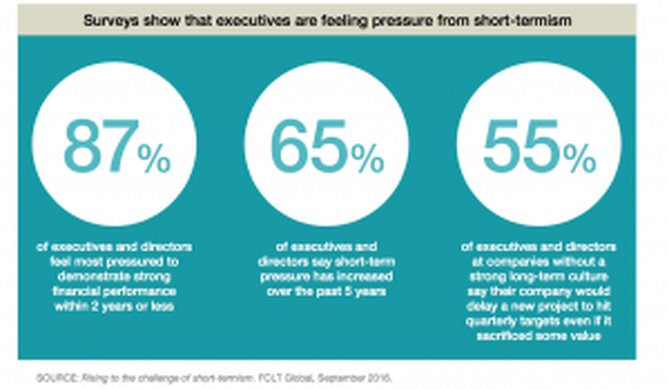There are a number of different models that investors use. Some people trade financial securities minute by minute – and aim to make their money as ‘day traders’. Others aim to make money by ‘timing the market’, while others still have a high turnover of investments in an aim to make short term gains, or by arbitraging the timing of information flows or between different markets.
Moneyworks’ financial planning clients all have a long term investment focus. When you are accumulating your funds for a long term goal like retirement, you may even have a 30+ year time horizon. When you reach retirement, your funds may still have to last you for 20-30 years, and you should separate your next couple of years spending of funds out of your long term investment portfolio (ideally holding them in a bank account or term deposit.)
Therefore, as your advisers, we find it frustrating when many of the companies that are available for investing around the world have a focus on ‘short termism’. Over the last twenty years, there has been a drive for every company to increase their profits each quarter, and the short term investing public rewards the companies for doing this.
The reason that we are raising this now is because in recent months there has been an increase in commentary and analysis about the impact of short termism on the success of companies and therefore – your investments.
In Warren Buffets 2016 newsletter (released in late February 2017), he commented that he can’t see how managers can ‘keep making the numbers’, and that he questions the validity of the numbers, and in particular the ‘tricks’ that are taken to adapt the numbers – like ignoring restructuring costs – to ensure that the profits keep increasing each quarter.
We question how structural changes can be made, and long term investment can be prudently make if the focus is on profit now, profit now. Some good things come from investing and waiting (as we have seen with the Sirtex investment in the Hunter Hall portfolios, as an example.)
We have also noted the McKinsey report on their study and analysis, published in mid February 2017 - "Measuring the Economic Impact of Short-Termism', which concluded that:
Using a data set of 615 large- and mid-cap US publicly listed companies from 2001-2015, we have created a ve-factor Corporate Horizon Index. It is based on patterns of investment, growth, earnings quality, and earnings management. It enables us to separate long-term companies from others and compare their relative performance, after controlling for industry characteristics and company size. Our findings show that companies we classify as “long term” outperform their shorter-term peers on a range of key economic and financial metrics.
McKinseys research also found that pressure on short term results is increasing – BUT that this pressure was more exacerbated in capital intensive industries.
On an industry level, our findings suggest that as of 2015, idea- intensive industries such as software and biotechnology are among the most long-term, while capital-intensive industries such as automobiles and chemicals are among the most short-term. Against this backdrop, it seems plausible that in some industries a growing profit pool encourages long-termism within an industry, while adverse economic conditions may drive short-termism as investors grow increasingly worried about short-term viability.
In summary, while the short termism of the markets as a whole continue to concern us, we are pleased to note that it does not seem to have as much impact on the companies that your fund managers are generally investing in, which tend to be more idea-intensive companies, than capital-intensive.
By Carey Church



